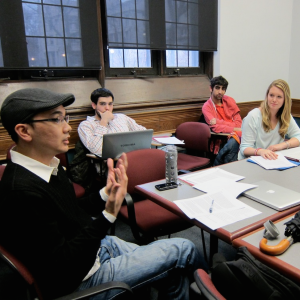As UChicago’s newest Assistant Professor of Practice in Creative Writing, Vu Tran is tasked with cultivating young authors’ skills—an endeavor that’s as personal as it is pedagogical, requiring a blend of philosophy and pragmatism. “The practical aspect of it is removing bad writing from their work—and by ‘bad writing’ I mean objectively the mistakes that most writers make when they first start out,” he says. “Philosophically, I help students organize their ideas of what it means to be human—to identify it, think about it, and then dramatize it in fiction.”
That challenge is specific to each individual and often far removed from his or her other academic pursuits. “Students tell me that when they take a creative writing class, they use a different part of their brain,” says Tran, who teaches both graduate and College classes. Intense and honest self-reflection is essential to good writing, he believes. To improve, students must be willing to listen to honest feedback and then respond to it in their work.
To develop an environment where students will accept unvarnished critique, Tran focuses on earning their trust. “I create a relationship where they can be open and honest and not care about what they should do to please everyone,” he says. The goal is to hone each student’s authorial voice, stripping away whatever “bad writing” surrounds and obscures it. He gets them to trust their instincts, embrace their own unique outlook, and find a point of view that will carry their ideas. “Fiction is an obstructed view of the world,” he explains. “Even with an omniscient narrator you can’t see everything. But that kind of limited blindness is crucial, because that’s what motivates the story.”
Tran guides students toward harmonious combinations of plot, character, perspective, and style—and ultimately toward having faith in their abilities. Even so, he acknowledges that it can be difficult for writers to feel satisfied with their work. Tran is the author of award-winning fiction and a popular teacher. (Read his biography here). Yet when asked what he struggles with most, he laughs and replies, “What don’t I struggle with?”
As he finishes editing his first novel, a Las Vegas detective story, Tran reflects on the range of inspirations that drive his writing process. While the narrative is important—“as a reader, I’ve always read for plot, and character often comes out of that”—some pieces begin as explorations of a philosophical concept or a compelling setting. The trick is wrangling these disparate elements and bringing them together to produce “something that feels honest and true and moving and compelling and convincing, all at the same time.” That’s the standard Tran holds for his own writing, and he wants his students to achieve it too.



Add new comment